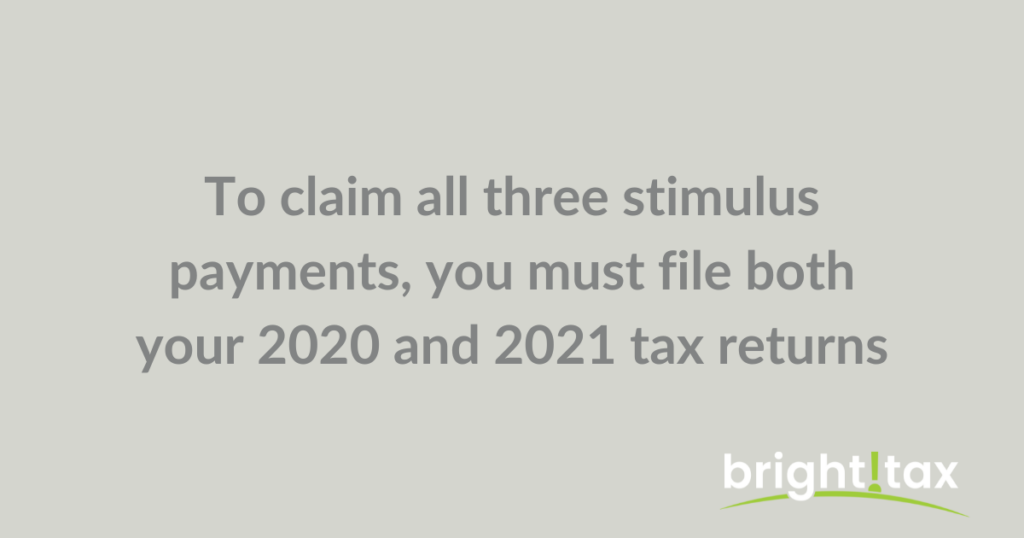United States Expats: Did you receive your three COVID-19 stimulus payments from the IRS? If not, you could be eligible to claim up to $3,400, but you need to act soon.
Important context: The stimulus checks relate to the federal government’s initiative to offer some financial relief to individuals and families in the wake of the COVID-19 pandemic.
Also known as the Stimulus Payments, Economic Impact Payments, or the Recovery Rebate Credit, three legislative initiatives in 2020 and 2021 provided up to $3,400 per individual and up to $2,500 per eligible child. They were:
Here’s what to know about the CARES Act
The CARES Act refers to the Coronavirus Aid, Relief, and Economic Security Act. Congress passed this legislation on March 25, 2020. It was signed into law on March 27, 2020.
It provides up to $1,200 per adult from the federal government. This doubles to $2,400 if you’re married and filing a joint return.
This amount is entirely free and non-taxable.
Additionally, Americans are entitled to an additional $500 for each dependent child if you have eligible dependents. Qualifying children were defined as those below 17; expats should also be aware that these children also qualify for a Child Tax Credit. This means that in addition to the sums discussed within this article, American parents living abroad with children could be entitled to even more.
If you’re married and have two children, you could be eligible for up to $3,400. Put another way, that’s nearly 1.5x the average monthly rent in the Greater London area, which is one of the most expensive places to live in Europe.
All Americans, green card holders, and resident aliens are eligible to claim stimulus payments
However, the total amount each person receives depends on their financial situation. The threshold at which you receive the full financial benefit is an Adjusted Gross Income (AGI) of not more than $75,000—or $150,000 for joint filers.
If you have an AGI above these figures, the cash you’ll get will be less by $5 for every additional $100.
For example: Let’s say Frank, an American data scientist in Dubai, has an AGI of $76,000. Suppose Frank is filing his 2020 tax return as single. Frank will not get the full $1,200. Instead, he’ll receive $1,150.
This is because the excess AGI amount is $1,000 ($76,000 – $75,000), and $5 for the ten $100s—that make up the $1,000—sums to $50.
OK. But how do you know you’re eligible for this cash? Even now, you may receive cash payments directly to your bank account or by check related to the CARES Act if:
- You are a citizen, permanent resident, or resident alien.
- You’re filing as an individual, and your AGI is not more than $99,000.
- You’re filing jointly as a married couple, and your combined AGI is not more than $198,000.
- You have a Social Security Number. (This is crucial because if you’re filing as a married couple and one of you has an Individual Tax Identification Number (ITIN), both of you may lose out.)
- You have filed your 2020 tax return.
And, of course, you must not have already received this stimulus payment.
The Tax Relief Act – Congress’ second legislative initiative

Enacted in December 2020, the Tax Relief Act untied the federal government’s purse strings for an additional $600 for every eligible taxpayer and dependent.
The eligibility criteria for payments related to the Tax Relief Act closely mirror those of the CARES Act. This includes the AGI thresholds, the tax filing year (2020), the citizenship/residency status, and the criteria for claiming benefits related to child dependents.
But there’s one striking difference.
While with the CARES Act, you can get up to $1,200 per adult and $500 for every additional qualifying child, with the Tax Relief Act, you can get only up to $600 as an individual. The same goes for every additional eligible child you claim.
| CARES Act | Tax Relief Act | |
| Maximum amount you can get per adult | $1,200 | $600 |
| Amount for each qualifying child | $500 | $600 |
Think of the Tax Relief Act as one that supplements the CARES Act. You don’t get one or the other. You can benefit from both pieces of legislation.
But the news just gets sweeter—
The American Rescue Plan – Congress’ third legislative initiative
The American Rescue Plan is the last of the three pieces of legislation passed by Congress to provide non-taxable, direct payments to American citizens and resident aliens in the wake of the COVID-19 pandemic.
Enacted in March 2021, the American Rescue Plan provides payment of up to $1,400 for eligible individuals. If you are married and filing jointly, the total amount you can get goes up to $2,800.
And with the American Rescue Plan, you can receive $1,400 for every qualifying dependent, including adult dependents. It’s not limited to qualifying children like the CARES and Tax Relief Act.
The American Rescue Plan has one notable difference compared to the other two initiatives. It’s claimable on the 2021 tax return, not on the 2020 tax return.
American expats living abroad are still eligible for stimulus checks and payments!

The IRS usually gives individuals up to three years to file the relevant returns for which the claim is being made. That means that for the two stimulus payments claimable on the 2020 tax return, you have until June 15, 2024, to file your returns.
On the flip side, for the $1,400 American Rescue Plan claimable on the 2021 tax return, you have until June 15, 2025.
Need to catch up on expat tax filing?

Are you reading along and getting excited about the prospect of being able to claim potentially thousands of dollars in tax-free payments from the IRS, but worried or confused because you’re a little behind on filing? No worries! If you’re behind on your tax filing obligations to the US, there is a way to catch up penalty-free and claim any stimulus payments or relevant tax credits for which you might be eligible. This procedure is called the Streamlined Procedure.
Remember, even if you already filed your tax return, you or a certified accountant (ideally specializing in expat taxes!) can still file an amended one.
Contact a Bright!Tax today to discuss how you can maximize your stimulus payment claims and minimize your overall US tax liability. The COVID-19 pandemic will be one recorded as one of the defining challenging periods of our generation, and our team is committed to ensuring that the maximum amount is claimed for each of our expat partners.
Read our 12-Step Guide to Tax Filing Success for more useful information for American expats filing taxes from abroad.

 Connect on LinkedIn
Connect on LinkedIn

